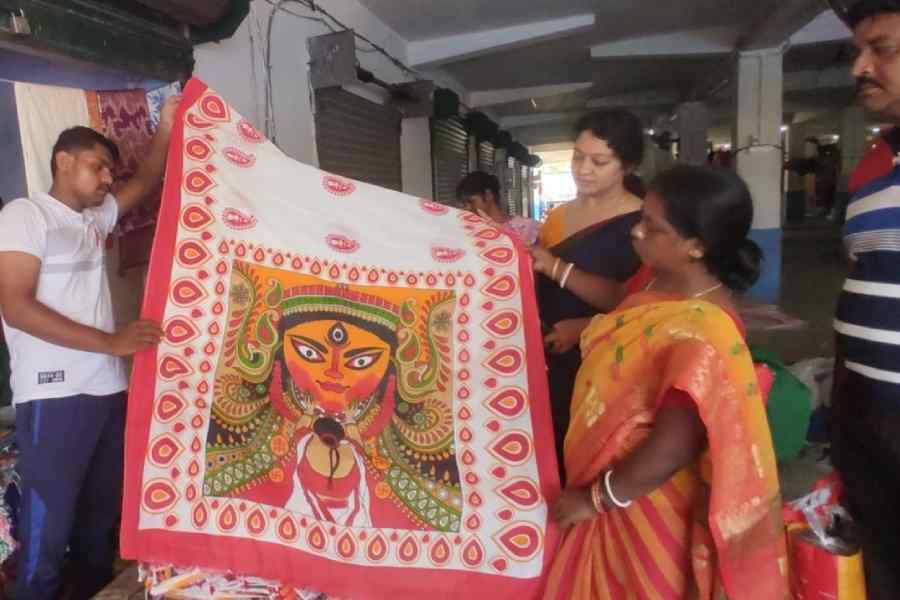It has been a weepy festive season for the weavers of Bengal.
The rape and murder of a junior doctor at RG Kar Medical College and Hospital and the upheaval in its aftermath have taken a toll on Durga Puja business, the lifeline of traders in Bengal. Weavers and traders are witnessing low sales of saris as the festive mood has been marred by the August 9 brutality.
“Only a month left before the Puja and the sale of saris is significantly lower compared to earlier years. Apart from the pandemic years, I have never seen such a dampened festive mood in my 18-year career,” said Nani Sutradhar, a weaver and sari seller from Samudragarh in East Burdwan’s Kalna.
Samudragarh and its adjoining areas are home to around 15,000 weavers, half of whose annual income comes from Puja-time sales. The Samudragarh Sari Haat is a century-old market where around 2,000 weavers from different districts, including East Burdwan, Nadia and Murshidabad, converge every Sunday and Thursday to sell saris.
Apart from small retailers from various districts, including those in north Bengal, hundreds of women from nearby areas visit the market to buy saris at comparatively low prices. “This year, there are hardly any women customers, which is unusual,” a weaver said.
Sutradhar pointed out that women have been at the forefront of the RG Kar protests across the state.
“Even the small retailers who usually buy saris from us are saying they cannot afford to take the risk of stocking up for Puja as sales are not picking up. I make saris and also buy stocks from fellow weavers. I borrowed ₹10 lakh from the bank for Puja business and was hoping to make a profit. If the situation does not change, many like me will face huge losses,” he said.
Other than weavers, lakhs of artisans, dhakis, small traders and garment sellers are heavily dependent on Durga Puja. Last year, the state government had pegged the Puja-time business at ₹72,000 crore, almost double the previous year’s ₹40,000 crore. Many believe the economy received a boost because of Unesco’s Intangible World Heritage tag for Durga Puja.
Weavers in Hooghly’s Dhanekhali, a hub of handloom saris, said their situation was no better than their Samudragarh colleagues.
“We also want justice for the doctor who was brutalised. But people protesting should understand that a large part of our consignments is sold in Calcutta. Traders from Calcutta who buy our products have not shown up so far,” said Dinabandhu Laha,
the secretary of the Dhanekhali Union Tant Shilpo Cooperative Society Limited, which
has 120 members.
Dhanekhali saris are sold at various government outlets in Calcutta and also at private shops across the city.
“Those who usually buy saris from us have told us that they are not getting buyers because of the protests in Calcutta every day. I will request the protesters to continue, but perhaps limit it to once or twice a week, at least during the Puja season, considering the plight of the weavers,” Laha said.
However, many weavers are still hopeful that the market will pick up soon, within one or two weeks.
Subir Karmakar, the organiser of the Samudragarh sari market, said business would bounce back.
“We are hopeful that people will take part in the biggest festival as always. Today’s footfall at our market was comparatively better than what it was in the past three days. We hope the situation will improve next week,” Karmakar said.










